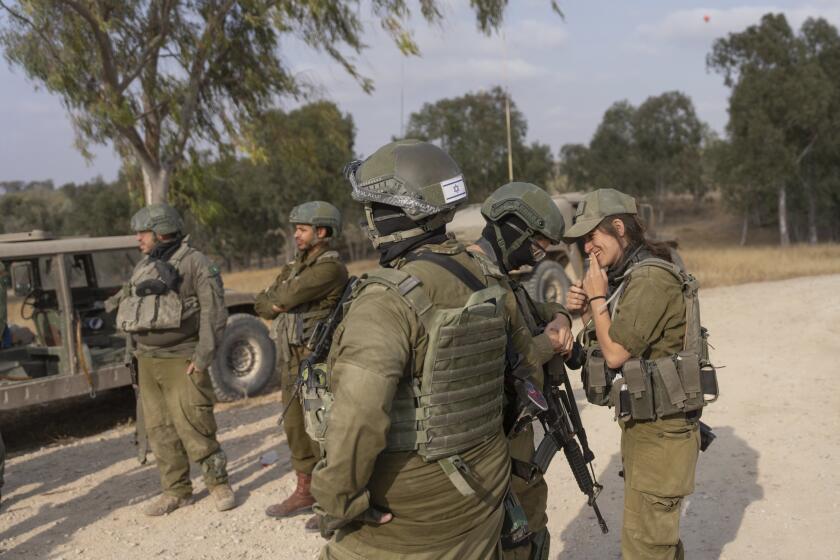2 Salvadoran Officers Get 30 Years for Slaying Priests
A civilian judge on Friday sentenced two army officers to a maximum of 30 years in prison for the 1989 massacre of six Jesuit priests, their maid and her daughter.
The murders, which occurred during a massive rebel offensive in San Salvador, sparked international outrage and a suspension of U.S. military aid.
The assassinations became one of the most notorious human rights crimes committed during the 12-year civil war that claimed 75,000 lives.
Criminal Court Judge Ricardo Zamora handed down the tough sentence a day after the Legislative Assembly unanimously voted an amnesty to forgive all but the most heinous of crimes committed by the army and the Farabundo Marti National Liberation Front guerrillas during the war.
The Jesuit case was one of those exempted from the amnesty. But neither the new law nor the sentencing ensures that the officers will remain in jail for the full term. The Assembly left open the possibility of another amnesty six months after an independent commission investigates and issues a report on the country’s worst human rights cases.
The commission was established under the terms of a negotiated peace agreement between the government and guerrillas. The agreement calls for a cease-fire beginning Feb. 1, and the amnesty was necessary for the rebels’ return to legal political activities.
Col. Guillermo Benavides and Lt. Yusshy Rene Mendoza were the first military officers ever convicted in a human rights case in El Salvador.
Last September, a civilian court convicted Benavides of eight counts of murder for ordering the killings; Mendoza was convicted of one count. But five other soldiers were declared innocent of the massacre, presumably because they had been following orders.
After the trial, international human rights groups and a U.S. congressman charged that other high-level army officers had prior knowledge of the priests’ murder.
Rep. Joe Moakley (D-Mass.), who headed a congressional task force that investigated the killings, asserted that members of the army high command may have participated in the decision to kill the priests or known of the plans beforehand. Moakley also charged that high-ranking army officers orchestrated a cover-up of the crime.
The priests, their maid and her daughter were killed Nov. 16, 1989, at the Jesuit residence on the grounds of the Central American University. They were dragged from their beds by soldiers in the middle of the night and summarily executed. Dozens of soldiers participated in the operation that night, and it was never clear how the court determined who should be charged.
Among the victims was the university rector, Ignacio Ellacuria. The army and extreme rightists had long asserted that he and the other Jesuits were the intellectual mentors of the leftist guerrillas.
“I think the sentence is just,” Charles Beirne, an American university administrator sent to the Central American University in 1990 to replace the slain vice rector, told the Associated Press.
Throughout the long legal process, the judge received numerous death threats. The U.S. government, the United Nations, international human rights groups and the Roman Catholic Church all opposed granting amnesty to the Jesuit killers.
Army officers, including the hard-line vice minister of defense, Gen. Juan Orlando Zepeda, monitored negotiations over the amnesty law in an apparent effort to free the convicted officers.
The amnesty law was drafted by a commission of rebels and government and political party representatives who reached a compromise hours before the deadline to approve it. By law, the decree had to be approved on Thursday, eight days before the cease-fire begins.
8 Victims of Civil War
A Salvadoran army colonel and a lieutenant were sentenced to 30 years in prison for the 1989 massacre of six Jesuit priests, their housekeeper and her daughter. Those killed were: * Father Ignacio Ellacuria, 59, rector of the Central American University. A leading human rights activist from Spain. * Father Ignacio Martin-Baro, 47, the university vice rector and head of its polling institute. Also from Spain. * Father Armando Lopez, 53, a professor of philosophy and theology. From Spain. * Father Juan Ramon Moreno, 56, also a Spanish professor of philosophy and theology. * Father Segundo Montes, 56, a sociology professor. From Spain. * Father Joaquin Lopez y Lopez, 71, a founder of church schools for slum children. A Salvadoran. * Elba Julia Ramos, 42, priest’s cook. From El Salvador. * Celina Ramos, 15, the cook’s daughter.
More to Read
Start your day right
Sign up for Essential California for news, features and recommendations from the L.A. Times and beyond in your inbox six days a week.
You may occasionally receive promotional content from the Los Angeles Times.






